|
|
|
Sort Order |
|
|
|
Items / Page
|
|
|
|
|
|
|
| Srl | Item |
| 1 |
ID:
104599
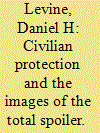

|
|
|
| 2 |
ID:
174655
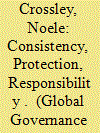

|
|
|
|
|
| Summary/Abstract |
Selective humanitarianism, it has been argued, may be condonable, or even preferable. Several arguments have been proffered in support of these views. This article revisits these arguments in light of the emergence of a discourse of protection and responsibility that now incorporates a wider spectrum of protection measures available to agents, of which armed intervention is but one. Consistency is an essential characteristic of ethics and the law—inconsistent practice diminishes the prospects of the development of norms of protection and associated practices and institutions. Furthermore, inconsistent practice means that fewer people receive protection from egregious violations of human rights. If the principles associated with human protection and humanitarianism are to become established norms of international society, international policy must be coherent, and international practice must be consistent.
|
|
|
|
|
|
|
|
|
|
|
|
|
|
|
|
| 3 |
ID:
162427


|
|
|
|
|
| Summary/Abstract |
Protection of civilians has remained problematic either when it occurs or when it does not. And this has generated heated debate among several theoretical schools, with grave consequences for international relations theorising. The Libya crisis in 2011 represents one of those cases that has led to arguments and counter-arguments, particularly on justification, agency, means and outcomes of the intervention. This study interrogates as to what extent cosmopolitanism shaped the need to protect civilians in the Libya crisis, the successes, challenges and the consequences of cosmopolitanism on the Libya intervention. The study argues that even though cosmopolitanism bears a large part in informing the need to protect civilians in Libya, the way and manner the intervention turns out to be poses a serious challenge to cosmopolitanism. Hence, there is the need for cosmopolitanism to think beyond justifying intervention to monitoring actors involved, institutions, intervention processes as well as the post-intervention era, especially in terms of rebuilding.
|
|
|
|
|
|
|
|
|
|
|
|
|
|
|
|
| 4 |
ID:
172166


|
|
|
|
|
| Summary/Abstract |
Do UN peacekeeping forces protect civilians from harm in post-war environments? Current evidence suggests that the answer to this question is yes. But extant research mostly examines this relationship at the country-level and consequently has logical difficulty tracing decreases in civilian fatalities to actual peacekeeper activities. We would have more confidence in the ability of peacekeepers to limit harm and protect non-combatants if the reduction in violence occurred locally where blue helmets were positioned. Using original geocoded data of yearly UN deployments in four Sub-Saharan African conflicts (Sudan, South Sudan, Democratic Republic of Congo, and Ivory Coast), we find that peacekeeping units get locally deployed to violent post-war areas and they reduce the level of civilian harm almost immediately. But, in areas without violent clashes between government forces and rebels, we find peacekeeping units more responsive to civilian targeting by rebels, which indicates a reluctance among peacekeepers to confront government forces that target civilians. While host nation consent is crucial for the success of a peacekeeping mission, the findings from this study caution against nurturing illiberal regimes by failing to check government atrocities. The failure to confront government abuse can jeopardize long-term peace and reconciliation.
|
|
|
|
|
|
|
|
|
|
|
|
|
|
|
|
| 5 |
ID:
181189
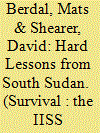

|
|
|
|
|
| Summary/Abstract |
South Sudan's tragic history of independent statehood raises important questions about the future of the United Nations Mission in South Sudan (UNMISS). UNMISS cannot bring peace to the country on its own. For that to happen, South Sudan's militarised form of governance and political economy must be transformed. Recognising UNMISS's limitations does not, however, preclude a vital and continuing role for the mission. UNMISS must work to reduce alarming levels of local and sub-national violence and help shore up the fragile peace agreement reached between Salva Kiir and Riek Machar in 2018. The mission must also manage the risks of further instability posed by poorly managed security-sector reform and elections scheduled for 2022. Finally, UNMISS and the UN must intensify the search for political avenues out of violence. To this end, renewed and constructive international engagement must be marshalled, and the UN must absorb important lessons from its own performance.
|
|
|
|
|
|
|
|
|
|
|
|
|
|
|
|
| 6 |
ID:
153952


|
|
|
|
|
| Summary/Abstract |
Protecting civilians from conflict and atrocities has become a major focus of governments, the UN, and activists. Yet peace operations—the main policy instrument for directly shielding civilians from violence—vary widely in how well they are designed to do so. One much-maligned problem is a gap between a force's ambitions to protect civilians and its physical resources for doing so. Missions plagued by these ambitions–resources gaps gesture toward protecting civilians but are not designed to do so effectively. They can also worsen civilian suffering. This article explores the politics behind these gaps, focusing on the role of powerful states—especially major Western democracies—in creating and facilitating them. It argues that ambitions–resources gaps represent a form of organized hypocrisy that helps political leaders balance competing normative and material pressures to protect civilians while limiting costs and risks. Case studies of France's Operation Turquoise in Rwanda and US support for the African Union Mission in Sudan (AMIS) in Darfur support the argument.
|
|
|
|
|
|
|
|
|
|
|
|
|
|
|
|
| 7 |
ID:
106200


|
|
|
|
|
| Publication |
2011.
|
| Summary/Abstract |
When MONUC (the Mission de l'Organisation des Nations Unies en République Démocratique du Congo) was first deployed in the Democratic Republic of Congo (DRC) in late 1999, the territorial integrity of the DRC was at stake as the country was divided into autonomous f?efdoms controlled by the national government and several rebel groups. Concomitantly, the country also played host to a number of foreign national armies as well as non-state armed groups that took advantage of the confused situation in the DRC to pursue their respective security, economic, or simply survival agendas. In over a decade of deployment, MONUC contributed greatly to the preservation of the DRC's territorial integrity. The mission also played a crucial role in establishing relative peace, security and stability in central Africa's largest state. However, all these achievements could not wipe away significant shortcomings experienced by MONUC, stemming from both internal and external factors to the mission, especially with regard to the protection of civilians.
|
|
|
|
|
|
|
|
|
|
|
|
|
|
|
|
| 8 |
ID:
152382
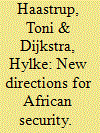

|
|
|
|
|
| Summary/Abstract |
African security, particularly conflict-related political violence, is a key concern in international relations. This forum seeks to advance existing research agendas by addressing four key themes: domestic politics and peacekeeping; security sector reform programs; peace enforcement; and the protection of civilians. Each of the articles in this forum makes a case for analyzing African agency when it comes to African security. As a way of introduction, this short article sets out the main debates and concludes by providing further directions for future research.
|
|
|
|
|
|
|
|
|
|
|
|
|
|
|
|
| 9 |
ID:
106775


|
|
|
|
|
| Publication |
2011.
|
| Summary/Abstract |
This article examines how operationalizing the 'responsibility to protect' (R2P) concept may assist in defining the scope of civilian protection mandates for peacekeepers, which are ambiguously restricted by three caveats - 'imminent threat of physical violence', 'area of deployment' and 'capabilities'. It is argued that by restrictively interpreting civilian protection mandates in the light of R2P the limited resources of peacekeeping troops would be more effectively utilized to protect civilians from mass atrocity crimes. Greater investment would be required to build capacity among the more creative and specially trained units to protect civilians from physical violence, in addition to greater coordination between the military and those specially trained units.
|
|
|
|
|
|
|
|
|
|
|
|
|
|
|
|
| 10 |
ID:
134149
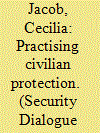

|
|
|
|
|
| Publication |
2014.
|
| Summary/Abstract |
Inspired by the practice turn in the field of international relations, this article contributes to the growing interest in the sociological and potentially transformative nature of the concept of human security, with a specific emphasis on the protection of civilians affected by armed conflict. Drawing on fieldwork conducted in Cambodia and Myanmar on the protection of children affected by armed conflict, it argues for a fresh analysis of human security through the lens of a 'politics of protection'. By mapping the work of international, government, and non-governmental actors involved in the protection of conflict-affected populations, the article shows that the distinction between welfare/development-oriented approaches and security-oriented approaches creates a protection gap for vulnerable populations in practice. This brings into question the salience of a security-development nexus conceptualization of human security. Instead, a politics of protection lens offers an alternative starting point for the study of security practices in conflict-affected societies, and facilitates a reconceptualization of human security as a transformative approach to contesting the politics and practice of civilian protection.
|
|
|
|
|
|
|
|
|
|
|
|
|
|
|
|
| 11 |
ID:
120771


|
|
|
|
|
| Publication |
2013.
|
| Summary/Abstract |
Can local organizations give civilians the capacity to protect themselves from civil war violence? Civilians have traditionally been considered powerless when facing armed groups but new research suggests organized communities may promote security through nonviolent strategies such as resolving disputes between neighbors and managing relations with macro-armed actors. This article analyzes whether and how these 'mechanisms' designed to retain community autonomy functioned in the community-case of the Peasant Worker Association of the Carare River (ATCC) in Colombia. The Carare civilians developed a local institutional process to investigate threats against suspected armed group collaborators to clarify the 'fog of war' and reform civilian preferences to participate in the conflict. This process is evaluated in reference to existing hypotheses about violence in civil wars such as the balance of territorial control using qualitative evidence from original field research. A unique within-case database created through focus group sessions with community 'conciliators' is used to analyze not only acts of violence, but also threats that were defused. Despite the prevalence of conditions that would predict persistent violence against civilians, the local institution itself proved to be a critical factor for both explaining and limiting levels of violence. The results suggest civilian choices and their consequences did not merely result from the capabilities or choices of armed actors.
|
|
|
|
|
|
|
|
|
|
|
|
|
|
|
|
| 12 |
ID:
181418
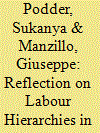

|
|
|
|
|
| Summary/Abstract |
Why do the attitudes of United Nations military peacekeepers towards peacekeeping shift after their deployment from positive to negative ones and how do labour hierarchies influence this shift? Using surveys with military peacekeepers gathered within a professional military education (PME) context, we conducted an exploratory pilot study about individual attitudes towards UN peacekeeping operations (UNPKOs) after deployment. We found that a majority changed their opinion about UNPKOs as an effective tool for peacebuilding from positive to negative. Specifically, we found that 82% of troops from the Global South changed their perceptions from positive to negative after deployment; while 59% of Global North peacekeepers did not change their perceptions. This shift was on account of enduring command and control challenges, problems with analysing intelligence, and, the growing demands of robustness to protect civilians, which increasingly place peacekeepers from the Global South at the risk of armed attacks and under scrutiny for underperformance. Findings urge scholars and policy-makers to address the problem of labour hierarchies in the political economy of peacekeeping as a significant source of misalignment between the perceptions and experiences of troops from the Global South and the growing expectations of performance from them.
|
|
|
|
|
|
|
|
|
|
|
|
|
|
|
|
| 13 |
ID:
116896


|
|
|
|
|
| Publication |
2013.
|
| Summary/Abstract |
Classified by the UN as one of five core challenges to civilian protection, humanitarian access denial is an increasingly urgent dilemma facing humanitarian actors. Conventional thinking about humanitarian access denial focuses on its outcomes rather than factors that shape its occurrence. The norms associated with humanitarian access and civilian protection are highly institutionalised at the intergovernmental level, yet states demonstrate considerable variation in their compliance with them at the domestic level. Utilising an interpretivist approach, we analyse how actions taken by states to deny humanitarian access in Ethiopia, Sri Lanka and Darfur/Sudan are given meaning and how they come to be understood by state actors themselves as a conduit to pursue other goals. We propose a descriptive typology of humanitarian access denial, and discuss the implications this phenomenon carries for civilian protection by humanitarian actors.
|
|
|
|
|
|
|
|
|
|
|
|
|
|
|
|
| 14 |
ID:
106202


|
|
|
|
|
| Publication |
2011.
|
| Summary/Abstract |
The United Nations Organisation Stablisation Mission in the Democratic Republic of Congo (MONUSCO) finds itself operating in an environment that is becoming increasingly complex. Its current involvement in the Democratic Republic of Congo (DRC) may signify a realisation that the drafters of the mission's mandate may not have come to terms with significant shifts in the geopolitical landscape of the Great Lakes region. The anticipated drawdown and withdrawal of MONUSCO is expected to have serious implications for stability and peace in the DRC. Unless an internal solution with unequivocal support from the Congolese people is found, the continent will continue to be faced with a problematic Great Lakes region. Africa's cautious approach to the Congolese crisis will require it to deal with increasingly more difficult questions that may require radical reponses.
|
|
|
|
|
|
|
|
|
|
|
|
|
|
|
|
| 15 |
ID:
145709
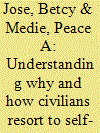

|
|
|
|
|
| Summary/Abstract |
The absence and limitations of civilian protection efforts have contributed to civilians in conflict zones adopting a variety of strategies to protect themselves from physical violence. These self-protection efforts have sometimes saved individuals and communities from violence and engendered a level of security. Nonetheless, the civilian protection literature and community have largely underestimated the importance of these self-protection strategies. This article traces the growth of the civilian protection regime and interrogates the absence of civilian self-protection therein. It reviews the emerging self-protection literature and offers a typology of civilian self-protection strategies. Additionally, this article sheds light on how self-protection strategies might undermine civilian protection, particularly when they contribute to civilian targeting during armed conflict. It also proposes ways in which this typology can be extended to foster theory building and can inform traditional civilian protection efforts.
|
|
|
|
|
|
|
|
|
|
|
|
|
|
|
|
| 16 |
ID:
113208
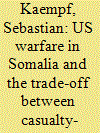

|
|
|
|
|
| Publication |
2012.
|
| Summary/Abstract |
This article examines the ways in which the two normative concerns of casualty-aversion and civilian protection influenced US military strategy in the particular context of the asymmetric conflict in Somalia in the early 1990s. The article critically evaluates US military operations through the prism of international humanitarian law and examines whether American forces started prioritizing casualty-aversion over the safeguarding of Somali civilians. Finally, by drawing on emerging moral guidelines (such as Michael Walzer's idea of 'due care'), the article examines whether lower numbers of Somali civilian deaths could have been achieved if marginal increases to the risks faced by US soldiers had been accepted.
|
|
|
|
|
|
|
|
|
|
|
|
|
|
|
|
|
|
|
|
|